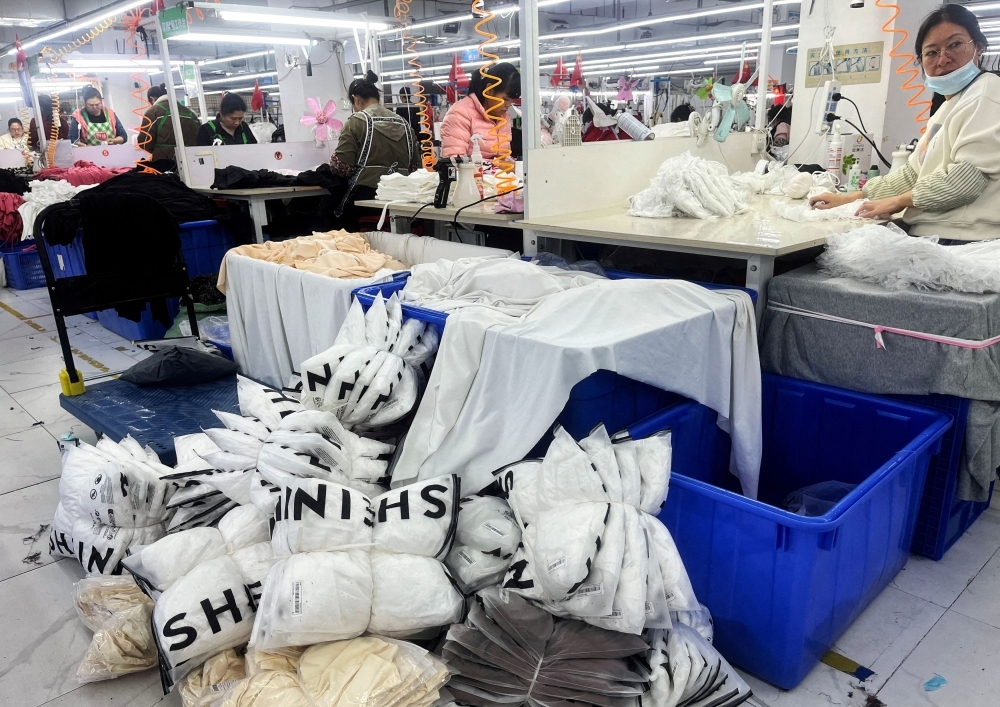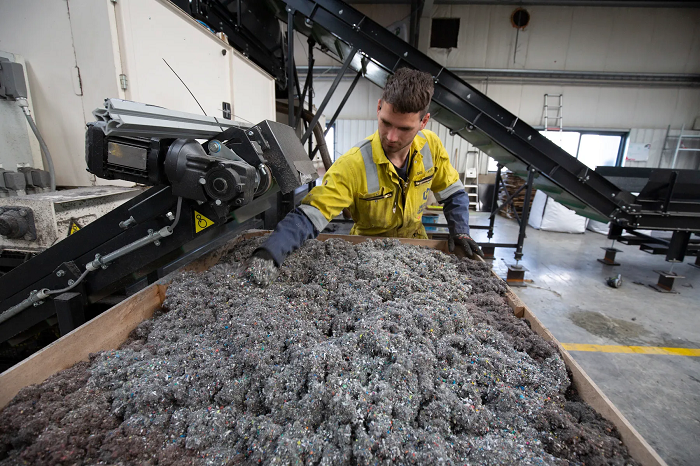FW
For its 2020 Conscious Fashion Report, global fashion search platform Lyst examined online searches for more than 100 million shoppers worldwide from February 2019 to February 2020. While online searches for women’s sustainable fashion continue to outpace men’s across the globe, Lyst’s data shows that consumers are searching for sustainable items that fit into their on-the-go metropolitan lifestyles.
As the home of the Copenhagen Fashion Summit and sustainable apparel brands like Knowledge Cotton Apparel and By Signe, it should come as no surprise that Denmark has seen the biggest year-on-year growth in searches for sustainable fashion, with searches rising by 114 percent. The highest percentage of searches, the report noted, are coming from Copenhagen.
In particular, Danish consumers are investing in eco-friendly denim—a trend that emphasizes the growing awareness around organic cotton, sustainable finishing and garments offering durability and longevity.
Berlin is proving to be the hotspot for sustainable fashion in Germany, where searches for sustainable fashion grew 53 percent year-over-year. While Berliners are seeking ‘faux fur coats’ and “vegan leather jackets,’ searches in the rest of Germany skew toward practical items like parkas and sneakers, Lyst reported.
Perhaps boosted by Inditex’s pledge to use responsibly sourced fabrics by 2025, searches for sustainable fashion in Spain have more than doubled. Lyst’s data shows consumers are searching for eco-friendly sweaters and vegan products. Searches indicate that B Corp-certified fashion brand Ecoalf is a current favorite as well as Patagonia and Stella McCartney.
French consumers are seeking leather alternatives. In France, where searches for sustainable fashion increased 50 percent, Lyst reported that the most-searched terms are “vegan Dr Martens boots” and “vegan Veja sneakers.” Consumers are also searching for faux leather trousers—a trend inspired by the runway.
Function and sustainable fashion go hand in hand in Canada, where consumers are searching for eco-friendly parkas and jeans.
In Italy, where Lyst reports a 20 percent uptick in sustainable fashion searches, ‘eco fur’ and “recycled fashion” are keywords to watch. Shoppers from the Lombardi region are the ones who drive the highest number of eco-friendly fashion searches, though Lyst’s data was compiled before the area was stuck with COVID-19.
Dresses lead searches for sustainable fashion in the UK Fashion searches including the keyword “organic” are currently trending in the UK and are up 19 percent month-on-month, Lyst reported. “Second-hand” and “vegan” are also popular keywords among British shoppers.
And Russian consumers are warming up to sustainable fashion. With Moscow generating the highest number of searches in the country, searches increased 14 percent year-over-year. Russian customers are especially interested in organic cotton T-shirts and vegan leather boots.
Tencel has launched a site dedicated to its 2020 Earth Month campaign with brand partners in home and apparel.
The site launched April 3 to mark the 50th anniversary of Earth Day. It will highlight one of Tencel’s brand partners and their work to support environmental responsibility.
Home brands taking part include Bearaby, Farm to Home, West Elm, Molecule, QE Home and The Company Store. Apparel partners include Athleta, Bella Dahl, Bleusalt, BN3TH, Boyish, Calitas Intimates, Closed, Eileen Fisher, Guess, Hanky Panky, Kings of Indigo, Lucky Brand, Mara Hoffman, Mavi, Metawear, MeUndies, Orvis, Paperlabel, Patagonia, Triarchy and Yes.
Each brand is focused on working to decrease their environmental impact, and their use of Tencel fibers part of the effort. The initiatives range from reducing water usage in their production process, working only with low impact fibers, ingredients, and materials, and supporting incredible environmental causes, including the United Nations Sustainable Development Goals.
PVH Corp, one of the world’s largest apparel companies, has completed the sale of its Speedo North America business to Pentland Group, parent company of the Speedo brand, for $170 million cash, subject to a working capital adjustment. The proceeds from the transaction will further bolster PVH’s core balance sheet strength and add to its liquidity position that stands now at over $1.3 billion in cash and available borrowings.
Pentland Group, which also owns the Berghaus, Canterbury, Ellesse and SeaVees brands, acquired Speedo in 1991 and directly and through partnership with licensees like PVH has since developed it into the world’s leading performance swimwear brand. Pentland will now operate the Speedo businesses worldwide.
The completion of the Speedo North America acquisition, during these uncertain times, demonstrates the company’s long-term commitment to the business and its passion for building a truly global brand. This acquisition will allow it to offer our customers a stronger global brand proposition when demand resumes.
The Textile Clothing & Footwear Industry Council of Fiji has urged the government to arrange with the Fiji National Provident Fund (FNPF) to deal with COVID-19 effects. This is the same deal announced for workers in the hospitality sector who have lost their jobs or have had their hours cut.
The minister for economy and attorney general Aiyaz Sayed-Khaiyum had announced recently that Fijian workers in the hospitality sector who have lost their jobs or have had their hours cut since February 1 can access an initial $1,000 from their FNPF accounts, with additional funds to be considered as the situation unfolds further, according to a report in a Fijian newspaper.
The council directly employs 7,000 Fijians and 80 per cent of the employees are women. Garment factories that have closed recently include Lyndhurst Ltd, Danam Fiji and Nagsun Apparel, while Intimate Apparel Ltd in Vatuwaqa will operate for another month.
According to India Ratings and Research (Ind-Ra), the nationwide lockdown in India is likely to impact the textiles sector both in terms of demand and supply and the EBITDA might drop by least 15 per cent in 2020-21 across the industry portfolio, a report said.
While India's dependency on imports is limited, it is dependent on exports and hence, the return of demand from the key markets including the US, the UK, the UAE and China is critical. The EBITDA (earnings before interest, taxes, depreciation and amortisation) will drop at least 15 per cent in FY21 across its textile portfolio, the report said.
Further, the COVID-19 pandemic is likely to continue to impact the global textile production and supply chains and thereby textile product prices. The Indian textiles industry has taken a major hit because most of Indian yarn exports are to China, it added.
The agency estimates India's exports will be substantially hit till the first half of FY21, which had already reduced by more than 40 per cent till January 2020 due to the US-China trade war. Meanwhile, it revealed that cotton prices continued to soften in February 2020, due to lower export demand and squeezed domestic consumption. They fell to Rs 111 per kg in February 2020, compared to Rs 118 in the same month in 2019, on account of reduced offtake by mill owners, which are facing the heat of excess production and supply disruptions amid the spread of COVID-19.
However, the Cotton Corporation of India continues to hold up the stock (40 per cent of total arrivals) and would maintain the current prices over the short term. While in the long term, a higher uncertainty regarding the duration of lockdown would be negative for the prices and pressure the liquidity of cotton spinners who are holding a cotton inventory of three to four months.
Primark has established a fund to cover the wages component of orders that have been cancelled. The company asked suppliers to stop production as it already had some £1.6 billion of paid-for stock in stores, depots, and in transit. All of this stock has been paid for under its normal 30-day payment terms.
On top of that, extended payment terms have been offered to suppliers to enable Primark to take and pay for further stock ready for shipment. This is despite the fact that nothing can be sold while the stores remain closed. In addition, Primark is concerned about the impact of workers engaged in production on further orders that Primark will now not be taking – that is, goods in production that were due for shipment in the month following cancellation of orders.
Accordingly, Primark has announced that it will fund payment of the wages that relate to this product, taking into account adjustments for government support packages provided in each country. This action will cover orders from Bangladesh, Cambodia, India, Myanmar, Pakistan, Sri Lanka, and Vietnam.
In consultation with external stakeholders, the Primark ethical trade team will explore mechanisms to ensure that this money reaches workers. Additionally, over the past two weeks, Primark has been working closely with the United Nation’s International Labour Organisation (ILO) in order to collaborate with governments, international financial institutions, development banks and others in a position to make available medium and longer-term financing to pay the wages and benefits of workers along with economic support to the garment industry.
Eurovet, the organizer of shows such as Interfilière Paris, has rescheduled its summer events to September due to the disruption of the COVID-19 pandemic. The company has also decided to postpone The Paris Fashion Week, in present exceptional circumstances.
Interfilière Paris and Riviera will be held alongside Who’s Next in early September to support the relaunch of the industry. In these events, suppliers of materials and textile accessories for Lingerie, Swim and Sport will come together while swimwear and lingerie brands will present their new collections at the Riviera show, the event for late-season orders.
Through this, Eurovet aims to allow international industry stakeholders to meet, exchange ideas and build the future. The organiser is committed to working with all players involved in order to accelerate this reboot together, once the industry emerges from this crisis.
Even though China has returned to relative normalcy while others are still reeling but conditions in the country’s manufacturing sector aren’t entirely rosy. Daily confirmed infections had dropped as the country employed dramatic actions to staunch the spread, but China’s National Health Commission reported 39 new cases of COVID-19 on Sunday, up from 19 on Saturday. Thirty-eight of the cases reported on Sunday means China hasn’t been able to stop new people from coming in and infecting its populous.
Guangdong, the center of China’s export-led manufacturing industries, reported six locally transmitted infections over the weekend, which means the spread there could be harder to slow. The continued dispersion of the pandemic, slowed or not, is posing problems for China’s production orders, which are shrinking and dragging the country’s exports down.
In a report, the China National Textile and Apparel Council (CNTAC), said the country is being hit with similar order cancellations from Western brands whose businesses have screeched to a sudden halt. But the decline in production orders means just 9 percent of manufacturers are reaching 80 percent of their normal export capacity, and more than 61 percent say their export orders are less than half of what they’d typically have.
According to weekly reports and cluster survey data, 80 per cent of enterprises reported that there were insufficient orders this week, which was 23 percentage points higher than a week ago. The entire export industry chain is facing greater operating pressure, and the starting load has shown a downward trend.
Covid-19 has led to exporters bleeding with upwards of 15-20 per cent of the orders getting cancelled and a major amount of funds being locked up, owing to non-payment of dues by large buyers in the US, Europe and West Asia, prompting them to seek a bailout from the government.
Food and farm products seemed to be the sole exception is robust demand for essential products. However, there are challenges in availability of containers and packaging material and machinery, along with certification required for products such as spices that are to be shipped to Europe.
According to Engineering Export Promotion Council president Ravi Sehga, if the lockdown doesn’t end soon, exporters could be staring at losing around 80 per cent of their orders. In a study, Gems & Jewellery Export Promotion Council has warned of an additional $2.7-billion impact in 2019-20 as shipments in March are projected to fall by 12 per cent compared to the average decline of 5.5 per cent seen during the previous months of the last year.
AEPC said close to Rs 15,000 crore (around $2 billion) worth of orders in the pipeline have been cancelled, while payments to the tune of Rs 10,000 crore are held up.
The Cotton Association of India (CAI) has retained its cotton crop forecast for the 2019-20 season, beginning from October 1, 2019, at 354.50 lakh bales of 170 kg each as in the previous estimate. The total cotton supply estimated by the CAI during October 2019 to March 2020 is 327.53 lakh bales (170 kg each) which consists of the arrivals of 283.03 lakh bales up to March 31, imports of 12.50 lakh bales and the opening stock estimated by the CAI at 32 lakh bales.
Further, the CAI estimates cotton consumption during October 2019 to March 2020 at 154 lakh bales, while the exports have been estimated at 31 lakh bales up to March 31.
Stock by the end of March is estimated to reach 142.53 lakh bales, including 34 lakh bales with textile mills and the remaining 108.53 lakh bales with Cotton Corporation of India (CCI) and others (MNCs, traders, ginners, among others).
Cotton supply up to September 30, 2020 was estimated at 411.50 lakh bales (the same level as estimated in the previous month). Domestic consumption for the entire crop stood at 331 lakh bales, the same level as estimated by the Cotton Advisory Board in their meeting held on November 28, 2019. The CAI estimated exports for the season to have been 42 lakh bales, the same level as estimated in the previous year. The carryover stock estimated at the end of the season stood at 38.50 lakh bales.











